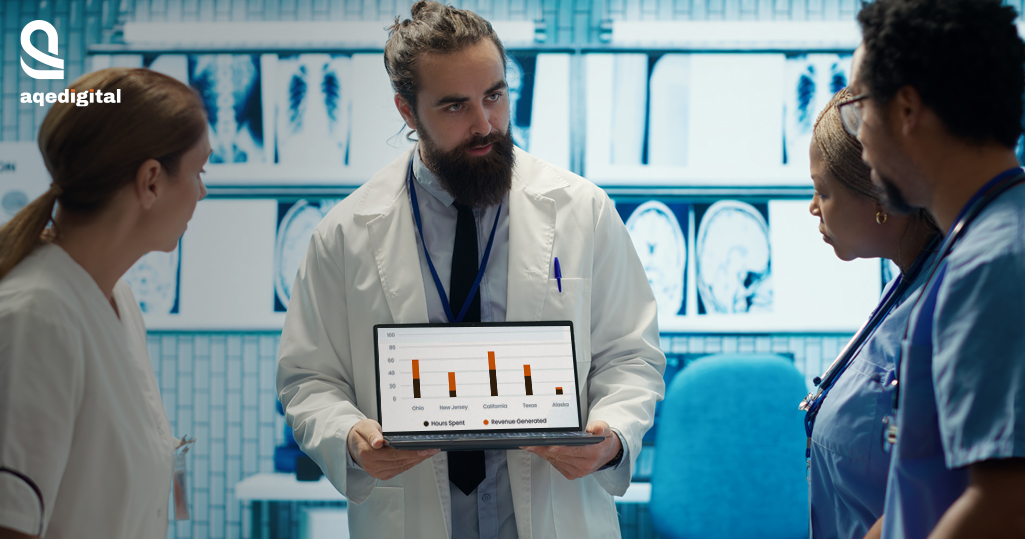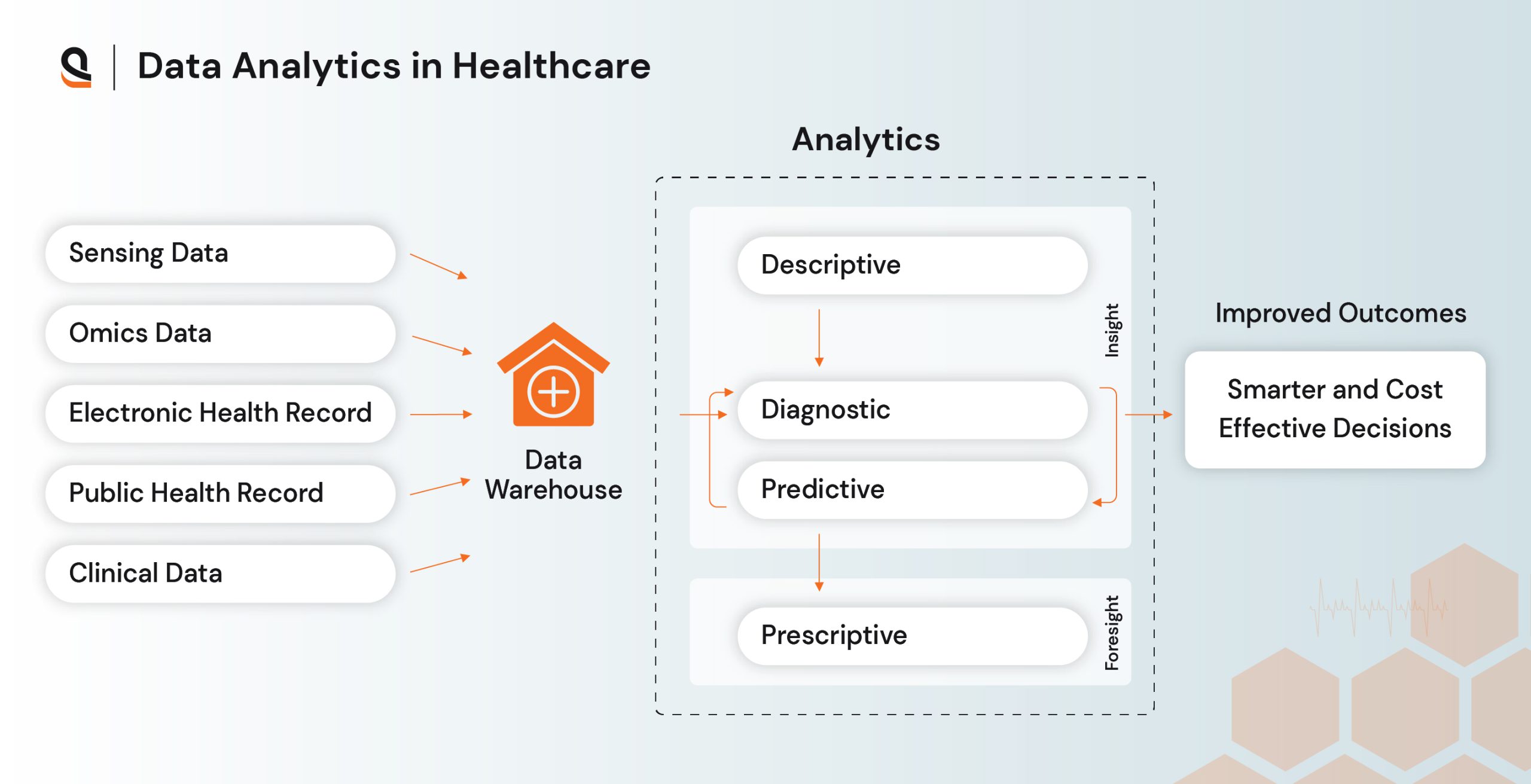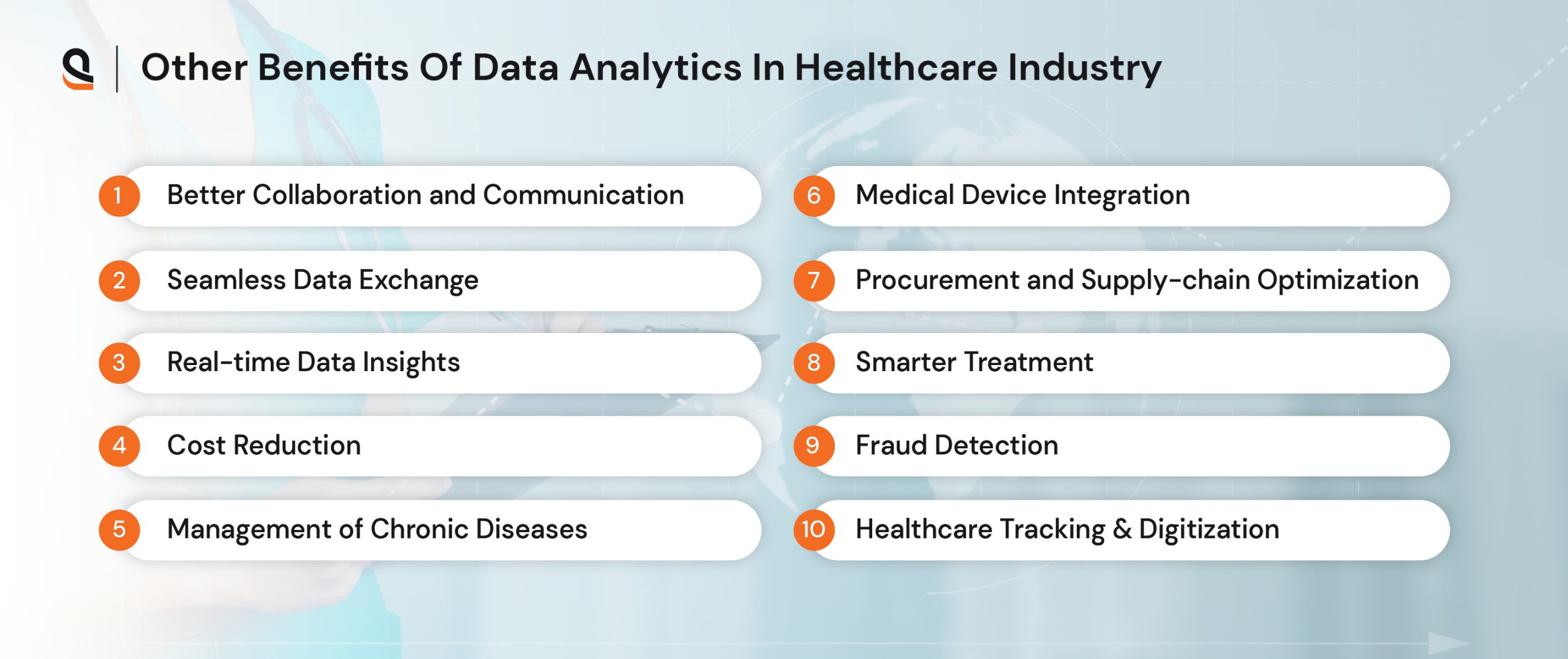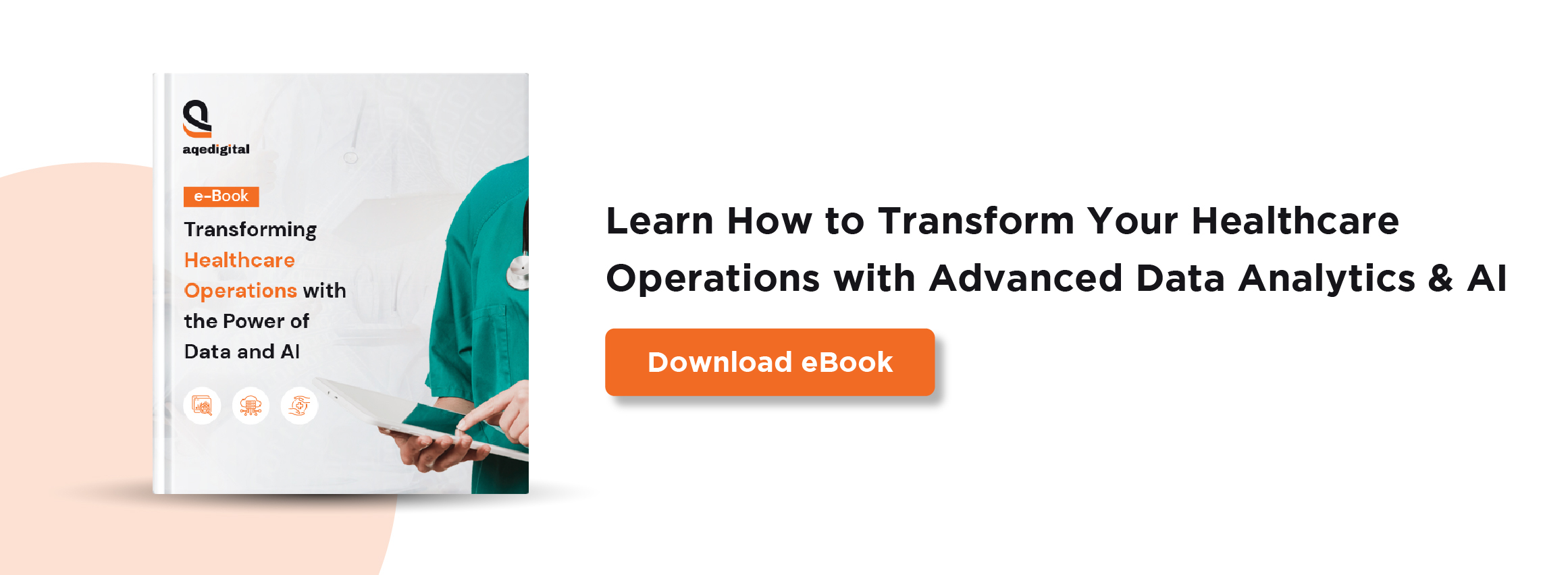Data has become a valuable asset with the growing influence of technologies, cloud, artificial intelligence (AI), and machine learning (ML). Data and data analytics have revolutionized finance, manufacturing, retail, and almost every industry, but it has significantly impacted the healthcare industry.
Why is healthcare data analytics becoming the buzz around the globe and for the healthcare industry? The big data in healthcare surged by a record 568% over the past ten years. Electronic health records, medical imaging, telemedicine, mobile health apps, and other medical devices are some of the aspects that contribute to the unprecedentedly growing health data pool.
The surging data and its management are a challenging part of healthcare analytics. However, implementing healthcare data analytics helps leverage and access that data easily and quickly. Data analytics in healthcare helps deliver better services, conduct advanced medical research, and enhance patient outcomes. Healthcare organizations struggle with how to benefit from the data, manage the data, and extract actionable insights from a vast amount of available complex data. Data analytics consulting and service-providing companies can help healthcare service providers who are searching for ways, techniques, and approaches to transform their data into assets with data analytics services.
What is Healthcare Data Analytics?
The healthcare sector creates vast amounts of data from multiple sources daily that can be used to identify hidden patterns and extract actionable insights, as well as trends within clinical data. In simple words, the primary objective of data analytics in healthcare data analytics is to enhance patient care and streamline healthcare processes using advanced data analytics tools and techniques.
Data analytics in healthcare impacts overall processes ranging from diagnostic imaging to administrative and billing systems. It helps medical professionals and healthcare providers by predicting patients’ medical interventions and treatments based on their medical history and possible scenarios. Healthcare data analytics consulting helps hospitals with better resource management and overall administration.
How Is Data Analytics Revolutionizing the Healthcare Industry?
Data analytics has transformed the healthcare industry by facilitating data-driven decision-making, improving patient outcomes, and optimizing operational efficiency. Data analytics in healthcare helps identify patterns, predict diseases, and personalize treatments.
One significant application is predictive analytics, which allows healthcare providers to anticipate disease outbreaks and patient deterioration. For example, hospitals use AI-driven analytics to monitor real-time patient data and predict conditions like sepsis, enabling early intervention and reducing mortality rates. Another example is the use of big data in precision medicine, where genetic and clinical data are analyzed to tailor treatments for individual patients.
Data analytics in healthcare is driving a shift towards more proactive, efficient, and patient-centric care models.
Different types of data analytics in healthcare:
- Descriptive analytics
- Predictive analytics
- Prescriptive analytics
- Diagnostic analytics
Benefits Of Data Analytics In the Healthcare Industry
Better Patient Care
Leveraging healthcare data analytics services helps medical professionals deliver personalized and data-driven care by minimizing the trauma and risk associated with their treatment. Data analytics in healthcare enables medical practitioners to track, access, and analyze patient data securely and easily. It helps reduce errors in diagnosis, treatment determination, predicting diseases or medical emergencies, lower readmission rates, and provide treatment based on accurate data.
Data-Driven Decision Making
Healthcare data analytics provides quick insights into the most effective treatment, trends, and patterns available in the data that are not possible to access or analyze manually. Data analytics helps indicate certain conditions and common risk factors to be noticed while delivering the treatment. Accessing the right and real-time data helps medical professionals make effective decisions to provide the best treatment and enhance the quality of healthcare service.
Predictive Analysis for Preventive Care
Predictive capabilities of healthcare data analytics are one of the best benefits for the healthcare industry. It helps healthcare providers predict potential health complications by analyzing historical data. With predictive capabilities, it is possible to have early interventions and reduce severe complications as well as costly treatments.
According to a study conducted in 2023, a machine learning algorithm identified individuals at high risk of developing type 2 diabetes with 94% accuracy. The combination of clinical data and individual historical data made it possible for healthcare data analytics to identify and predict the potential risk of type 2 diabetes.
Optimized Operational Efficiency
Data analytics in the healthcare industry helps manage the resources in a more efficient way ranging from hospital beds, and staff to medical devices. According to a study, approximately 25% of the total spending in the U.S. is waste and if measures are taken to reduce waste it could help save between $191 and $286 billion across the healthcare industry.
Additionally, it helps healthcare organizations identify areas where they need to make certain improvements that can help streamline workflows, administration, processes, and treatment. With automation in healthcare, you can simplify repetitive tasks, reduce the risk of human error, and make faster decisions—all while improving the overall efficiency of your operations.
Efficient Staffing
Labor costs account for a significant part of hospital expenses. Data analytics in healthcare can be used to predict staffing requirements. It can also help in maintaining and scheduling the shifts to cater to patients with better services. With data analytics and AI, healthcare facilities can streamline and reduce labor costs by efficient resource utilization and allocation.
Minimizing Medical Errors
Healthcare data analytics helps organizations in curbing error rates, flag suspicious items for manual inspection, and provide insights into risk factors. It ensures timely detection and treatment helping healthcare service providers to be more vigilant and proactive. Data analytics in healthcare enables organizations to adhere to regulatory compliance by minimizing errors.
Few Of The Many Real-life Use Cases Of Data Analytics in the Healthcare Industry
Healthcare Dashboards: Gather data from disparate sources and incorporate it into a centralized dashboard to improve healthcare efficiency, make data-driven decisions, optimize resource allocation, and enhance patient outcomes by managing patient care more effectively.
Resource Allocation: Analyze admission records and historical data to identify patient demand patterns and forecast future patient volumes, leveraging data analytics. Manage staff schedules more effectively, ensuring sufficient coverage and minimizing unnecessary expenses.
Electronic Health Records (EHR): Healthcare organizations can improve their patient care quality by integrating data analytics into EHR. Analyze EHR data that includes medical records, test results, and other clinical information, leveraging the capabilities of data analytics to identify patterns or emerging health risks.
Telemedicine: Data analytics in healthcare have made telemedicine popular among patients and medical practitioners. Leverage data analytics to improve diagnosis, plan treatment, and provide personalized care by accessing data remotely.
Advanced Medical Imaging Analysis: Enhance diagnostic accuracy and efficiency by advanced medical imaging analysis that utilizes data from scans and identifies abnormalities. Data analytics processes comprehensive data more accurately than traditional methods enabling timely interventions and accurate disease detection.
Why Prefer AQe Digital While Choosing The Right Data Analytical Company?
While choosing the right healthcare data analytics service and consulting provider, one should consider the following aspects for better results and outcomes.
Expertise
Collaboration with a healthcare data analytics consulting and service provider that possesses deep domain expertise and industry knowledge helps organization meet their objective and goals easily.
Why AQe Digital?
AQe Digital, with extensive experience of more than 27+ years, brings quality and domain expertise in healthcare data analytics. With our healthcare data analytics consulting and services, we deliver solutions that enable organizations to extract valuable insights, streamline business operations, and optimize patient outcomes. Our expertise spans from healthcare data analytics to AI/ML to enterprise-level software, making us a comprehensive digital solution provider.
Tools and Technology
Technology stack and tools play a crucial role in delivering accurate and efficient healthcare data analytics solutions. With the growing importance of Cloud Computing in Healthcare, it is necessary to have a data analytics partner on board who is proficient in handling big data, AI, and cloud computing to make the data analytics journey smooth and effective.
Why AQe Digital?
Our team leverages advanced tools and technologies that include AI-powered analytics platforms, ML algorithms, and cloud-based data processing. Our data experts efficiently handle structured and unstructured data by leveraging advanced tools and platforms.
Data Security
Data analytics consultants and service providers must adhere to stringent security practices, comply with standard regulatory reforms, and implement robust data security measures to safeguard critical healthcare data privacy.
Why AQe Digital?
At AQe Digital, we prioritize data security and compliance by following HIPAA, GDPR, and other healthcare data protection regulations. Our team implements robust encryption, access controls, and other security practices to protect the data, ensuring compliance.
Communication and Support
Seamless and transparent communication is required for effective collaboration between healthcare providers and healthcare data analytics service providers. From continuous support to transparent reporting and communication, a reliable data analytics partner needs to have seamless communication and support channels.
Why AQe Digital?
At AQe Digital, we emphasize strong client engagement through clear communication, dedicated support teams, and 24/7 assistance. Our collaborative approach ensures that healthcare organizations receive ongoing support, quick resolutions, and customized analytics solutions tailored to their evolving needs.
Scalability
A reliable and experienced data analytics service provider should deliver flexible and scalable solutions. It should be relevant to current objectives, goals, and requirements as well as should be able to handle increasing data volumes, integrate with existing systems, and adapt to changing business requirements.
Why AQe Digital?
Our team delivers scalable healthcare data analytics solutions that scale with evolving business needs. We rely on cloud-based infrastructure and AI-driven models to enable seamless integration and expansion. We ensure healthcare providers can analyze and manage large datasets efficiently without compromising performance, leveraging our data analytics solutions.
Conclusion
Data analytics in the healthcare industry is the need of the hour — it’s essential today and will be even more critical in the future as data volumes grow and technology evolves. AQe Digital, your digital transformation partner, empowers healthcare providers to enhance operational efficiency, improve patient care, and make smarter decisions through data-driven insights. By integrating advanced data analytics into your workflows and processes, we help you unlock the full potential of your data and drive sustainable growth. Connect with us to stay ahead in the dynamic healthcare landscape and transform your data into a true competitive advantage.




